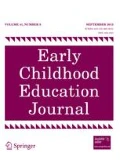Developing the ability to read is a complex process involving a variety of skills, including both basic language skills and language comprehension skills. Although a balanced reading program would include the development of basic language and comprehension skills, comprehension has often been overlooked in early reading instruction. In this article, we examine recent research findings on how comprehension skills develop in young children and discuss the implications of those findings for comprehension assessment and interventions.



Similar content being viewed by others
References
Applebee A., (1978). The child’s concept of a story: Ages two to seventeen. University of Chicago Press Chicago
Bourg T., Bauer P., van den Broek P., (1997). Building the bridges: the development of event comprehension and representation. In van den Broek P., Bauer P., Bourg T., (Eds) Developmental spans in event comprehension (pp. 385-407). Erlbaum Mahwah, NJ
Bruning R. H., Schraw G. J., Ronning R. R., (1999). Cognitive psychology and instruction Prentice Hall Upper Saddle River, NJ
Cain K., Oakhill J., Bryant P. E., (2004). Children’s reading comprehension ability: Concurrent prediction by working memory, verbal ability, and component skills Journal of Educational Psychology 96:31–42
Catts H. W., Fey M. E., Zhang X., Tomblin B. J., (1999). Language basis of reading and reading disabilities: Evidence from a longitudinal investigation Scientific Studies of Reading 3(4):331–361
Dickinson D. K., Snow C. E., (1987). Interrelationships among prereading and oral language skills in kindergartners from two social classes Early Childhood Research Quarterly 2:1–25
Dole J. A., Duffy G. G., Roehler L. R., Pearson P. D., (1991). Moving from the old to the new: Research on reading comprehension instruction Review of Educational Research 61:239–264
Ehri L. C., Nunes S., Stahl S., Willows D., (2001). Systematic phonics instruction helps students learn to read: Evidence from the National Reading Panel’s meta-analysis Review of Educational Research 71:393–447
Fuchs D., Fuchs L. S., Mathes P. G., Simmons D. C., (1997). Peer-assisted learning strategies: Making classrooms more responsive to diversity American Educational Research Journal 34:174–206
Gough P. B., Tunmer W. E., (1986). Decoding, reading and reading disability Remedial and Special Education 7:6–10
Graesser A., Singer M., Trabasso T., (1994). Constructing inferences during narrative comprehension Psychological Review 101:371–395
Kintsch W., van Dijk T. A., (1978). Toward a model of text comprehension and production Psychological Review 85(5):363–394
Leppanen U., Niemi P., Aunola K., Nurmi J. E., (2004). Development of reading skills among preschool and primary school pupils Reading Research Quarterly 39:72–93
Lorch E. P., Sanchez R. P., (1997). Children’s memory for televised events. In van den Broek P., Bauer P. J., Bourg T., (Eds.), Developmental spans in event comprehension and representation LEA Mahwah, NJ, 271–291
Morris D., Bloodgood J. W., Lomax R. G., Parney J., (2003). Developmental steps in learning to read: A longitudinal study in kindergarten and first grade Reading Research Quarterly 38:302–328
National Reading Panel (2000). Teaching children to read: An evidence-based assessment of the scientific research literature on reading and its implications for reading instruction. Jessup, MD: National Institute for Literacy
Oakhill J., Cain K., Bryant P. E., (2003). The dissociation of word reading and text comprehension: Evidence from component skills Language and Cognitive Processes 18:443–468
Palincsar A. S., Brown A. L., (1984). Reciprocal teaching of comprehension-fostering and monitoring activities Cognition and Instruction 1:117–175
Paris A. H., Paris S. G., (2003). Assessing narrative comprehension in young children Reading Research Quarterly 38:36–76
Pearson P. D., Gallagher M. C., (1983). The instruction of reading comprehension Contemporary Educational Psychology 8:317–344
Perfetti C. A., (1994). Psycholinguistics and reading ability. In Gernsbacher M. A., (Ed.), Handbook of psycholinguistics Academic Press San Diego, CA, 849–894
Pressley M., (2000). What should comprehension instruction be the instruction of? In Kamil M. L., Mosenthal P. B., Pearson P. D., Barr R., (Eds.), Handbook of reading research Vol. 3. Erlbaum, Mahwah, NJ, 545–586
Pressley M., McCormick C. B., (1995). Advanced educational psychology for educators, researchers, and policymakers. HarperCollins, New York
Snow C. E., (1983). Literacy and language: Relationships during preschool years Harvard Educational Review 53(2):165–189
Taylor B., Peterson D. S., Pearson P. D., Rodriguez M. C., (2001). Looking inside classrooms: Reflecting on the “how” as well as the “what” in effective reading instruction The Reading Teacher 56:270–279
Trabasso T., Secco T., van den Broek P., (1984). Causal cohesion and story coherence. In Mandl H., Stein N. L., Trabasso T., (Eds.), Learning and comprehension of text Erlbaum Mahwah, NJ, 83–111
Trabasso T., van den Broek P., (1985). Causal thinking and the representation of narrative events Journal of Memory and Language 24:612–630
Trabasso T., van den Broek P., Liu L., (1988). A model for generating questions that assess and promote comprehension Questioning Exchange 2:25–38
Trabasso T., van den Broek P., Suh S., (1989). Logical necessity and transitivity of causal relations in stories Discourse Processes 12:1–25
van den Broek P., (1994). Comprehension and memory of narrative texts. In Gernsbacher M. A., (Ed.), Handbook of psycholinguistics Academic Press, Inc London, 539–588
van den Broek P., (1997). Discovering the cement of the universe: The development of event comprehension from childhood to adulthood. In van den Broek P., Bauer P. J., Bourg T., (Eds.), Developmental spans in event comprehension and representation Erlbaum Mahwah, NJ, 321–342
van den Broek P., Kendeou P., Kremer K., Lynch J. S., Butler J., White M. J., Lorch E. P., (2005). Assessment of comprehension abilities in young children. In Paris S., Stahl S., (eds.), New directions in assessment of reading comprehension Erlbaum Mahwah, NJ, 107–130
van den Broek P., Lorch E. P., Thurlow R., (1996). Children’s and adult’s memory for television stories: The role of causal factors, story-grammar categories, and hierarchical level Child Development 67:3010–3028
Whitehurst G. J., Lonigan C. J., (1998). Child development and emergent literacy Child Development 69:848–872
Author information
Authors and Affiliations
Corresponding author
Rights and permissions
About this article
Cite this article
Kendeou, P., Lynch, J.S., van den Broek, P. et al. Developing Successful Readers: Building Early Comprehension Skills through Television Viewing and Listening. Early Childhood Educ J 33, 91–98 (2005). https://doi.org/10.1007/s10643-005-0030-6
Published:
Issue Date:
DOI: https://doi.org/10.1007/s10643-005-0030-6




